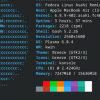Linux cluster will help research treatment of cancer, AIDS
Source: Newsforge
Researchers at the University at Buffalo, the State University of New York, have fired up a 2,000-node, 4,000 processor Linux cluster and hope the cluster's help in studying the human genome will lead to breakthroughs in the treatment of cancer, Alzheimer's and AIDS.
The cluster at the Buffalo Center of Excellence in Bioinformatics at SUNY Buffalo went online in mid-August and is often running at full capacity even though the set-up team is still doing some minor tweaking, says Jeffrey Skolnick, the soon-to-be director of the bioinformatics center.
Most of the computers in the cluster are 1.26 GHz Dell PowerEdge servers, with a few higher-speed Xeons thrown in. Subcontractor Sistina Software is providing cluster file system technology to manage the data traffic among the nodes.
Skolnick can rattle off all kinds of interesting statistics about the cluster. It will enable researchers to predict protein structure and run large-scale computer simulations, and work that would've taken 1,000 years on on processor will be done in three to six months on the cluster. "We're not just trying to collect computers, which is a nice little hobby," he says. "It enables us to do science we couldn't do elsewhere."









































































